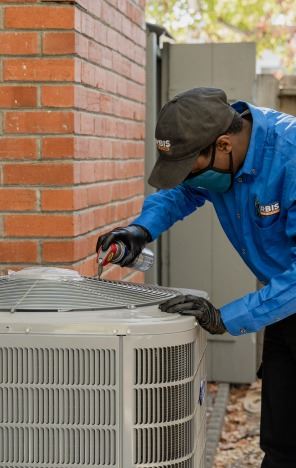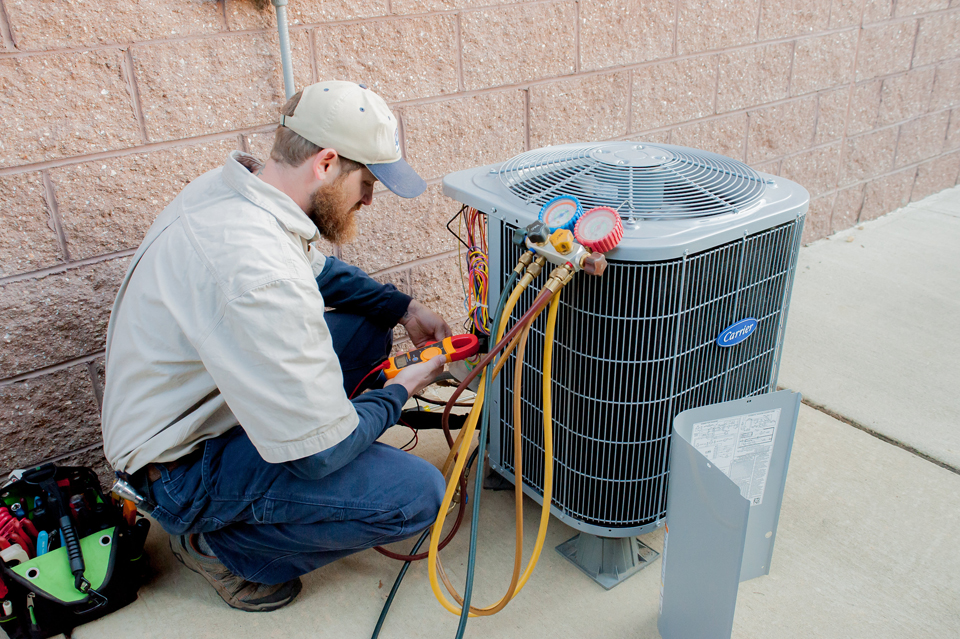Selecting Between a Warm Pump and Heater: Trick Factors To Consider for Your Cooling And Heating Demands
When reviewing home heating choices for cooling and heating requires, the choice in between a warmth pump and a furnace can be intricate. Each system supplies unique benefits customized to specific environments and energy efficiency objectives. Comprehending these differences is vital for making an enlightened choice. Trick aspects such as installation prices and environmental influence even more complicate the option procedure. Which choice truly straightens with one's convenience and sustainability preferences? The adhering to sections will certainly check out these considerations carefully.
Understanding Warmth Pumps: Exactly How They Function and Their Benefits
While numerous homeowners think about various heating alternatives, comprehending just how heat pumps feature and their advantages can greatly influence their choice. Heatpump run by transferring warm instead of generating it. In the wintertime, they draw out warm from the outdoors air or ground and transfer it inside, while in the summertime, they reverse this process, cooling down the home by getting rid of heat outside. This twin capability makes them flexible for year-round environment control.One of the key benefits of heatpump is their energy effectiveness. They use substantially much less electricity compared to traditional heating unit, potentially leading to reduced utility costs (heat pump replacement ooltewah tn). Furthermore, heatpump have a smaller sized carbon impact, making them an environmentally friendly choice. They likewise need much less upkeep than standard systems, adding to lasting expense financial savings. In general, understanding the technicians and benefits of warm pumps can assist home owners make notified decisions concerning their home heating and cooling needs
Exploring Heaters: Types, Procedure, and Benefits
Furnaces come in different kinds, consisting of gas, electric, and oil designs, each with unique operational systems. Comprehending these differences is necessary, as they affect effectiveness and heating performance. In addition, heaters supply many benefits, such as regular warmth outcome and integrity in chillier climates.
Kinds of Furnaces
Furnace can vary considerably in layout and procedure, with furnaces being a popular choice among house owners. There are numerous sorts of heating systems, each making use of different gas resources and innovations. Gas furnaces prevail, leveraging gas to generate warm effectively. Electric heaters, on the other hand, use electrical resistance to create warmth, usually preferred for their straightforward setup. Oil heating systems, while much less usual, are efficient in areas with minimal gas access (heat pump service). Additionally, condensing heaters optimize power efficiency by recording and reusing exhaust gases. Each kind runs via a system of warm exchangers and ductwork to distribute cozy air throughout a home. Comprehending the differences between these heater types is essential for notified a/c decisions
Benefits of Heating systems
For homeowners looking for reputable heat throughout chilly months, the advantages of heaters are substantial. Heaters give regular home heating, ensuring even temperatures throughout the home. They are particularly efficient in extreme cold, frequently surpassing heat pumps in cold problems. Numerous kinds, consisting of gas, electric, and oil furnaces, provide versatility to fulfill diverse demands and preferences.Furnaces also have a tendency to have reduced preliminary installment prices contrasted to warmth pumps, making them an extra available option for numerous. Their robust design adds to a longer lifespan, with many units lasting over 15 years with proper maintenance. Furthermore, modern furnaces are often geared up with sophisticated innovation for improved efficiency, which can lead to minimized power expenses. Overall, furnaces remain a dependable selection for effective home heating.

Power Performance: Comparing Warm Pumps and Furnaces
When contrasting power efficiency between warmth pumps and furnaces, the Seasonal Power Efficiency Ratio (SEER) plays a crucial duty in establishing performance. In addition, a functional price analysis exposes the lasting financial implications of each system. Understanding these aspects can assist homeowners in making notified decisions about their home heating services.
Seasonal Energy Efficiency Ratio
Power efficiency plays a necessary duty in the decision-making process between warmth pumps and heaters, specifically when thinking about the Seasonal Power Effectiveness Proportion (SEER) This metric measures the cooling efficiency of heatpump over an entire cooling period, giving a standardized way to evaluate performance. Higher SEER rankings suggest higher energy efficiency, equating to lower energy usage and decreased utility expenses. In comparison, furnaces are generally examined making use of the Annual Fuel Utilization Efficiency (AFUE) rating, which mirrors heating effectiveness. When comparing these 2 systems, home owners must focus on SEER rankings for heat pumps, as they directly influence overall energy savings and ecological sustainability. A comprehensive understanding of SEER can notably affect the long-lasting satisfaction and cost-effectiveness of the chosen heating and cooling remedy.
Operational Cost Evaluation
Comprehending the operational see it here costs connected with warm pumps and furnaces is essential for house owners assessing their choices. Heat pumps generally provide greater power performance, transforming electric energy into heat with marginal waste. This results in reduced regular monthly energy bills, particularly in moderate environments. On the other hand, traditional furnaces, especially gas models, may have lower in advance prices yet can incur greater functional expenses gradually due to fuel rates and performance ratings.Moreover, warm pumps can operate as both home heating and cooling down systems, potentially decreasing the need for different cooling and heating units. While first financial investments for heatpump might be higher, their long-term cost savings in energy performance can make them a much more cost-effective option for several houses. Cautious evaluation of neighborhood power prices is necessary to establish the most effective option.
Installment Prices: What to Anticipate for every Heater
Installment prices for heating systems can vary significantly between warm pumps and heating systems, affecting house owners' choices. Heat pumps typically have higher upfront installment costs, normally varying from $3,500 to $8,000, depending on the device dimension and complexity of installation. This includes the outdoor unit, indoor handling system, and necessary ductwork modifications. Conversely, furnaces tend to have reduced initial expenses, balancing between $2,500 and $6,000, which can be appealing for budget-conscious house owners. Nonetheless, installment expenditures can enhance if considerable ductwork is required.Moreover, the selection of fuel type for heaters-- gas, gas, or electric-- can also influence installment costs. While heat pumps use energy performance, their first investment might discourage some buyers. Eventually, reviewing installment costs along with long-lasting financial savings and effectiveness will help home owners in making notified decisions regarding their heater.
Environment Considerations: Which System Does Much Better in Your Location
Just how do climate conditions affect the effectiveness of heating unit? The performance of heatpump and heating systems can vary considerably relying on the regional environment. In moderate climates, heatpump excel by effectively moving heat from the outdoors air, making them an energy-saving option. Their performance decreases in very chilly temperatures, where they may struggle to extract enough heat. On the other hand, heating systems, particularly gas models, supply consistent and reputable warmth no matter outdoor conditions, making them more suitable in cooler regions.In locations that experience milder winters, heat pumps can operate successfully year-round, giving both home heating and air conditioning. On the other hand, areas with rough winters months frequently benefit from the robustness of heaters. Eventually, understanding the local climate is important when making a decision in between a warm pump and a heating system, as it straight impacts their operational efficiency and overall performance.
Maintenance Demands: Long-Term Look After Warmth Pumps vs. Furnaces
While both heatpump and heating systems need regular upkeep to ensure peak performance, their details demands and treatment routines vary significantly. Heaters typically require less regular attention, with annual evaluations sufficing to look for gas leaks, tidy filters, and assess total performance. Their less complex style often enables straightforward repairs.In comparison, warm pumps require biannual upkeep because of their double role in cooling and heating. This consists of cleaning coils, examining cooling agent degrees, and ensuring that both the indoor and outside devices function at their finest. In addition, heatpump upkeep typically involves more complex parts, making specialist servicing essential.Neglecting maintenance can bring about decreased efficiency and enhanced power expenses for both systems. Ultimately, homeowners need to take into consideration these long-lasting treatment needs when choosing between a heat pump and a heating system, as positive maintenance can prolong the life expectancy and efficiency of either system substantially.
Environmental Effect: Selecting a Lasting Heating Alternative
The ecological influence of heater is a critical evaluation for house owners seeking lasting alternatives. Warmth pumps are generally extra energy-efficient than standard furnaces, as they transfer heat instead of generate it, greatly decreasing carbon emissions. By utilizing renewable power sources, such as air-source or geothermal warm pumps, property owners can even more minimize their eco-friendly footprint.On the various other hand, natural gas furnaces release greenhouse gases and add to air pollution, though they often give greater warm output. Innovations in innovation have led to the growth of high-efficiency heating furnace replacement systems that minimize emissions.Ultimately, picking a home heating system includes weighing effectiveness against ecological effect. Homeowners are urged to assess regional power sources and incentives for renewable systems, ensuring a choice that aligns with both individual comfort and environmental duty. The choice impacts not only prompt comfort but additionally long-term sustainability and ecological wellness.
Often Asked Inquiries
How Lengthy Do Heat Pumps and Furnaces Commonly Last?
The lifespan of heat pumps commonly ranges from 15 to twenty years, while heaters can last between 15 to thirty years. Normal maintenance considerably impacts their long life and efficiency in providing home heating remedies.
Can I Use a Warm Pump in Very Cold Climates?
Warmth pumps can run in incredibly cool climates, however their performance reduces as temperature levels drop. In such conditions, extra home heating sources may be necessary to keep comfy interior temperature levels and guarantee the original source peak efficiency.

What Is the Noise Degree of Warmth Pumps Versus Furnaces?
The noise levels of heatpump and furnaces differ substantially. Usually, warmth pumps run even more silently than conventional heating systems, making them preferable for those delicate to appear, while heating systems might produce louder functional sounds during heating cycles.
Are Warm Pumps Suitable for Both Heating and Cooling?
Warmth pumps are without a doubt appropriate for both cooling and heating (ductless mini splits). They work by moving heat, providing effective temperature control year-round, making them a flexible option for property owners looking for an all-in-one a/c remedy
What Size Furnace Do I Need for My Home?
Establishing the ideal size heater for a home requires examining aspects such as square footage, insulation high quality, regional climate, and the home's design. Consulting a professional can assure an accurate analysis and ideal convenience. Heat pumps normally use higher energy performance, transforming electric energy into warmth with minimal waste. In moderate climates, heat pumps succeed by successfully transferring heat from the outside air, making them an energy-saving choice. Alternatively, furnaces, particularly gas models, supply reputable and regular warmth no matter of exterior problems, making them better in cooler regions.In locations that experience milder winters months, warmth pumps can run effectively year-round, offering both heating and cooling. Warmth pumps are usually extra energy-efficient than typical heaters, as they move heat instead than create it, substantially minimizing carbon exhausts. By utilizing eco-friendly power resources, such as air-source or geothermal warmth pumps, home owners can further minimize their eco-friendly footprint.On the other hand, natural gas heaters give off greenhouse gases and add to air contamination, though they typically offer higher warmth outcome.